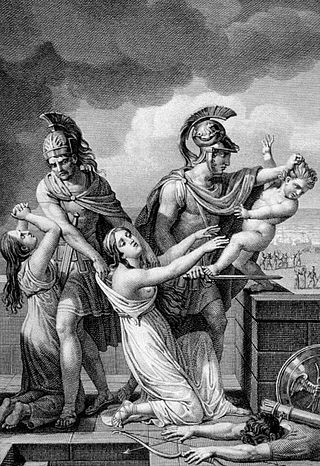The Trojan War was a legendary conflict in Greek mythology.
Trojan War may also refer to:
- Trojan War (film), 1997
- The Trojan War (board game)
- "The Trojan War" (Dream On), a 1990 television episode
The Trojan War was a legendary conflict in Greek mythology.
Trojan War may also refer to:

In Greek mythology, Hector is a Trojan prince, a hero and the greatest warrior for Troy during the Trojan War. He is a major character in Homer's Iliad, where he leads the Trojans and their allies in the defense of Troy, killing countless Greek warriors. He is ultimately killed in single combat by the Greek hero Achilles, who later drags his dead body around the city of Troy behind his chariot.

The Trojan War was a legendary conflict in Greek mythology that took place around the 12th or 13th century BC. The war was waged by the Achaeans (Greeks) against the city of Troy after Paris of Troy took Helen from her husband Menelaus, king of Sparta. The war is one of the most important events in Greek mythology, and it has been narrated through many works of Greek literature, most notably Homer's Iliad. The core of the Iliad describes a period of four days and two nights in the tenth year of the decade-long siege of Troy; the Odyssey describes the journey home of Odysseus, one of the war's heroes. Other parts of the war are described in a cycle of epic poems, which have survived through fragments. Episodes from the war provided material for Greek tragedy and other works of Greek literature, and for Roman poets including Virgil and Ovid.
Trojan or Trojans may refer to:

In Greek mythology, the Trojan Horse was a wooden horse said to have been used by the Greeks during the Trojan War to enter the city of Troy and win the war. The Trojan Horse is not mentioned in Homer's Iliad, with the poem ending before the war is concluded, and it is only briefly mentioned in the Odyssey. But in the Aeneid by Virgil, after a fruitless 10-year siege, the Greeks constructed a huge wooden horse at the behest of Odysseus, and hid a select force of men inside, including Odysseus himself. The Greeks pretended to sail away, and the Trojans pulled the horse into their city as a victory trophy. That night, the Greek force crept out of the horse and opened the gates for the rest of the Greek army, which had sailed back under the cover of darkness. The Greeks entered and destroyed the city, ending the war.
Agelaus or Agelaos is, in Greek mythology, the name of various individuals.
In Greek mythology, Theano may refer to the following personages:
In Greek mythology, Antiphates is the name of five characters.
In Greek mythology, Polypoetes was a name attributed to the following individuals:

The Trojan Women is a tragedy by the Greek playwright Euripides, produced in 415 BCE. Also translated as The Women of Troy, or as its transliterated Greek title Troades, The Trojan Women presents commentary on the costs of war through the lens of women and children. The four central women of the play are the same that appear in the final book of the Iliad, lamenting over the corpse of Hector after the Trojan War.
Pedasus has been identified with several personal and place names in Greek history and mythology.
Coon may refer to:
In Greek mythology, Pylaemenes may refer to two distinct characters:

Alecto is one of the Erinyes (Furies) in Greek mythology.
In Greek mythology, Epistrophus may refer to:
In Greek mythology, Ennomus was the name of two defenders of Troy during the Trojan War:

The Iliad is one of two major ancient Greek epic poems attributed to Homer. It is one of the oldest extant works of literature still widely read by modern audiences. As with the Odyssey, the poem is divided into 24 books and was written in dactylic hexameter. It contains 15,693 lines in its most widely accepted version. Set towards the end of the Trojan War, a ten-year siege of the city of Troy by a coalition of Mycenaean Greek states, the poem depicts significant events in the siege's final weeks. In particular, it depicts a fierce quarrel between King Agamemnon and a celebrated warrior, Achilles. It is a central part of the Epic Cycle. The Iliad is often regarded as the first substantial piece of European literature.
Menon may refer to:
In Greek mythology, Atymnius may refer to:
In Greek mythology, Pylaeus, son of Lethus, son of Teutamides, descendant of Pelasgus. He was one of the allies to King Priam in the Trojan War; he commanded the Pelasgian contingent together with his brother Hippothous. Pylaeus is hardly ever mentioned separately from his brother; they are said to have fallen in battle together by Dictys Cretensis and to have been buried "in a garden" according to the late Latin poet Ausonius.
The Fall of Troy may refer to: